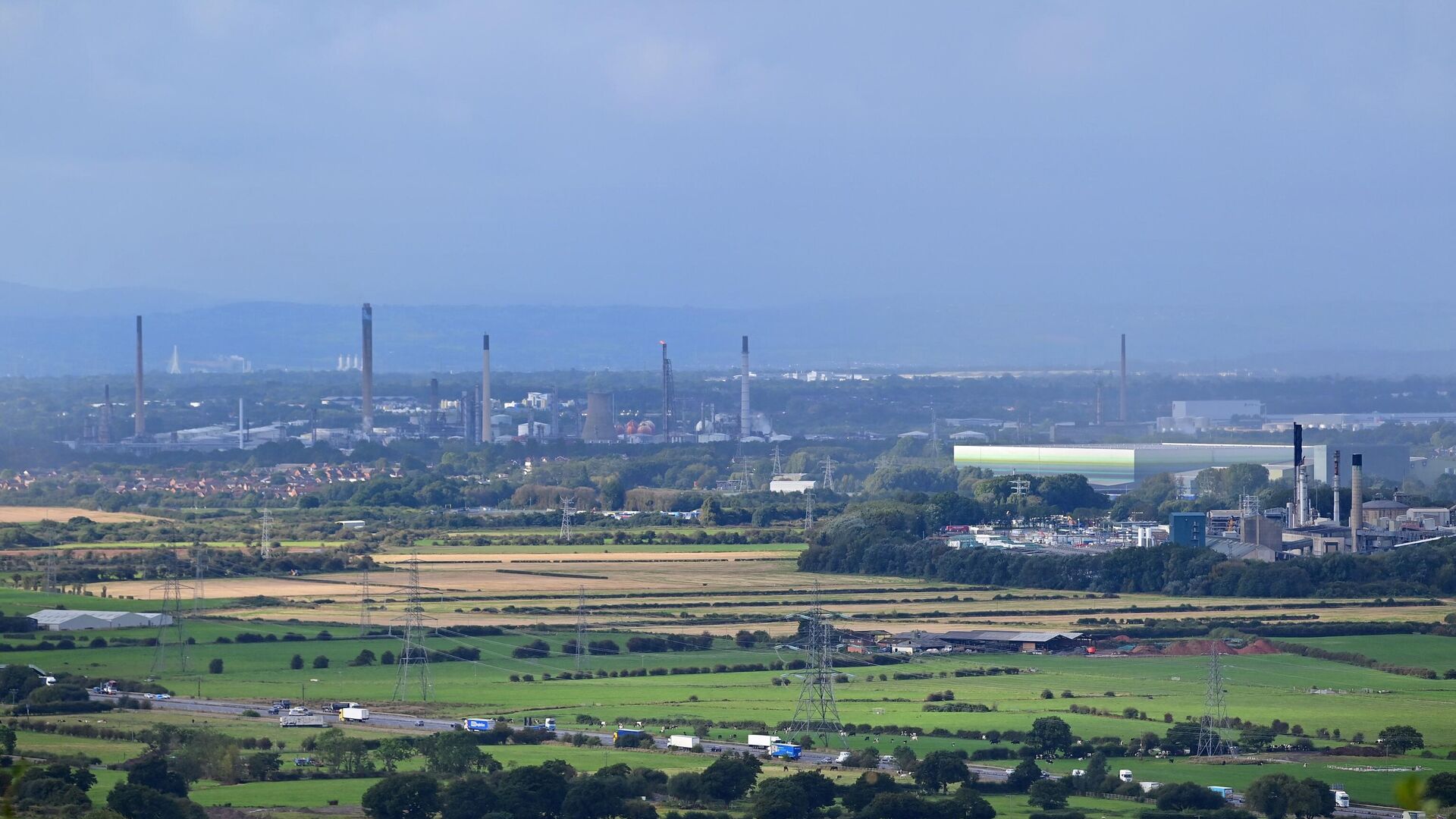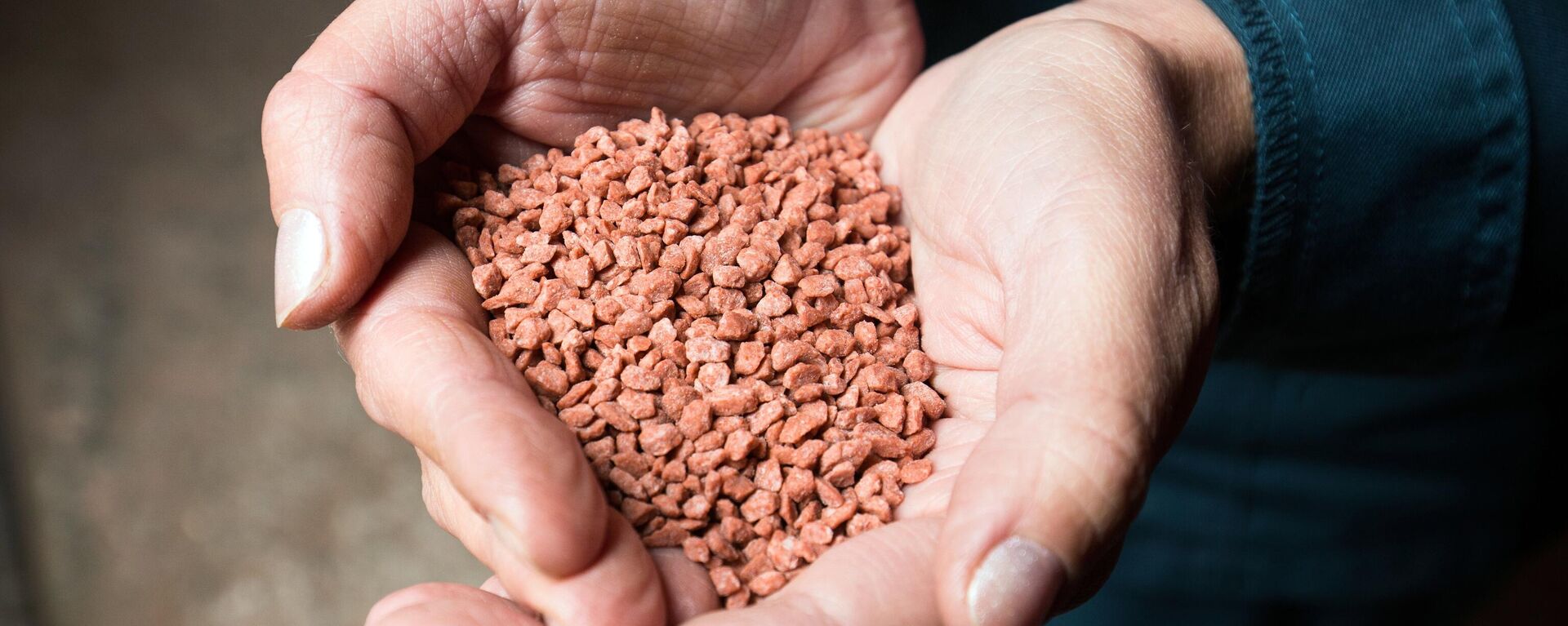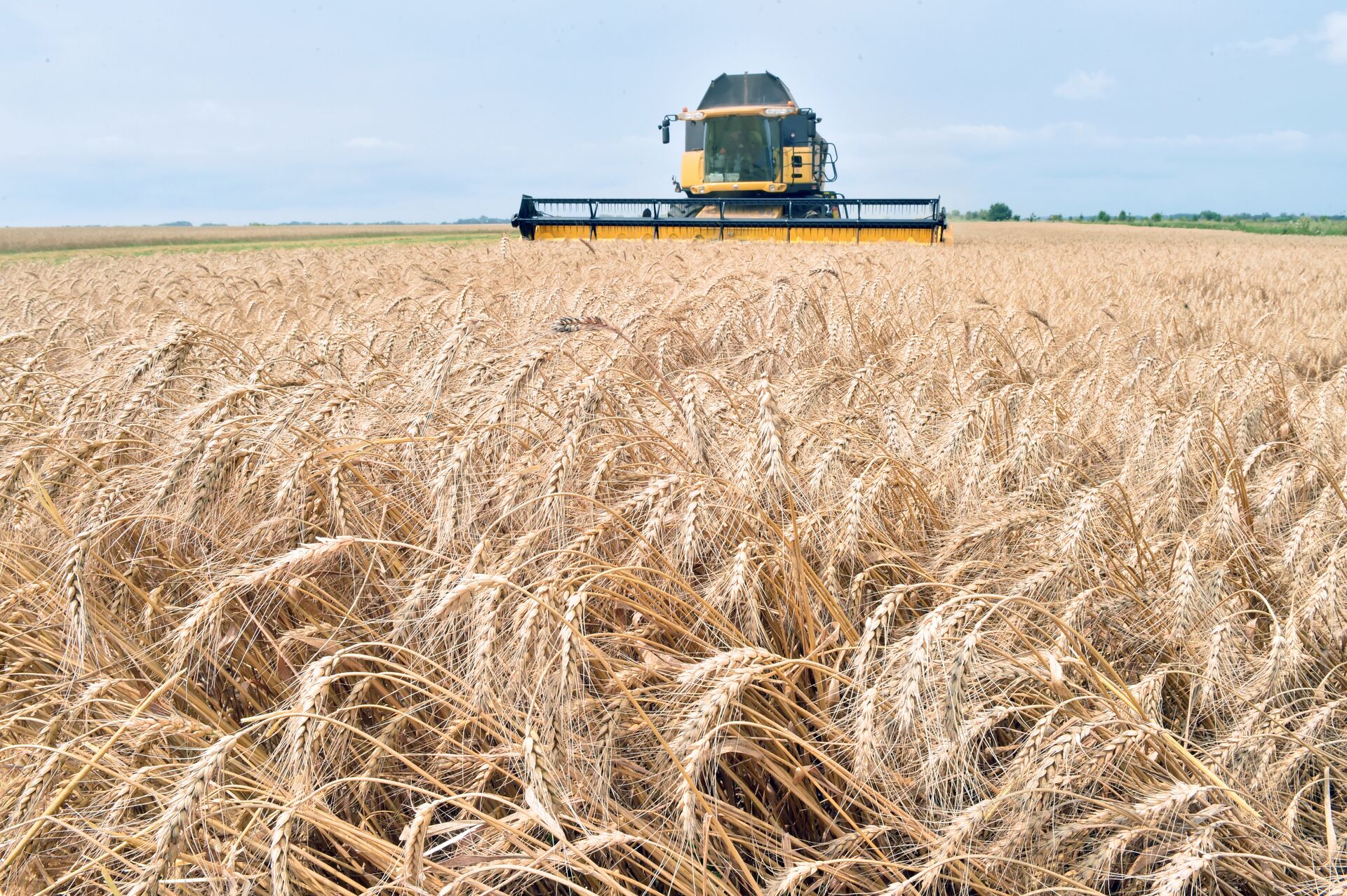https://sputnikglobe.com/20220610/uk-farmers-say-food-supply-may-grind-to-a-halt-as-major-fertiliser-plant-closes-over-energy-crisis-1096181158.html
UK Farmers Say Food Supply May 'Grind to a Halt’ as Major Fertiliser Plant Closes Over Energy Crisis
UK Farmers Say Food Supply May 'Grind to a Halt’ as Major Fertiliser Plant Closes Over Energy Crisis
Sputnik International
Concerns were raised of a large-scale food catastrophe since western countries slapped sanctions on Russia over its special operation to demilitarise and... 10.06.2022, Sputnik International
2022-06-10T09:14+0000
2022-06-10T09:14+0000
2023-05-28T15:19+0000
fertilizer
grain
ukraine crisis
nitrogen
food crisis
united kingdom (uk)
https://cdn1.img.sputnikglobe.com/img/07e6/06/0a/1096180604_0:18:3073:1746_1920x0_80_0_0_fd2ab0d2f27fdbad126d5dd5a2fbbc53.jpg
UK farmers have issued the dire warning that the country’s food supply is now “vulnerable" after soaring energy bills prompted a major British fertiliser plant to cease operations, reported The Daily Telegraph.CF Fertilisers, a subsidiary of US-based CF Industries Holdings, Inc., is one of Britain's largest ammonia plants. It announced on Friday that it was closing its Ince manufacturing plant near Chester as it can no longer afford to keep it open.Exorbitant natural gas prices and high environmental taxes had earlier led the plant to suspend production in September. Natural gas is the primary fuel source used in the production of ammonia, and according to CF Fertilisers, the price forecasts present a "constant challenge to the sustainability of current operations".CF Industries will, however, keep open its Billingham facility in County Durham. Billingham is the largest ammonia, ammonium nitrate and carbon dioxide supplier in the UK.This was made possible after intervention by the UK government, which arranged a deal between the carbon dioxide industry and fertiliser giant CF Industries."As a high-cost producer in an intensely competitive global industry, we see considerable challenges to long-term sustainability from our current operational approach," said Brett Nightingale, UK managing director of CF Fertilisers.CF Fertilisers UK described the move to focus its manufacturing operations in the UK exclusively at the Billingham manufacturing facility in Stockton on Tees as a “restructuring of operations”.The company acknowledged that shutting down the Ince manufacturing facility could result in up to 283 redundancies, and suggested that some of these could be avoided by “redeployment opportunities”.However, Nick Allen, chief executive of the British Meat Processors' Association, took a dim view of the situation.Tom Bradshaw, deputy president of the National Farmers' Union, lamented Friday's announcement from CF Fertilisers as a “further blow for farmers who are already suffering from incredibly high inflation for fertiliser costs”.The “very sad and disappointing news” prompted Jo Gilbertson, head of fertilisers at the Agricultural Industries Confederation, to warn:“Nitrogen fertiliser is the meat in a balanced diet for plants. This will affect all sorts of things… from the cost of milk and meat products on the shelves to the price of bread because milling wheat needs the high protein level you get from nitrogen. Then you have to import grain and there's a shortage of that because of the crisis in Ukraine.”Gilbertson was predicted a plethora of “knock-on effects,” as carbon dioxide is a by-product valuable for the food supply chain.According to the National Farmers' Union (NFU), high fertiliser prices will deter farmers from growing the wheat required for making bread.This comes as the cost of fertiliser has risen from around £200 per ton before the COVID-19 pandemic to around £625 per ton of late.Minette Batters, president of the NFU, emphasised that it was essential to carry on milling wheat to “fill the gap left by Russia and Ukraine on the global market”.Ukraine and Russia account for an estimated 30 percent of global exports of wheat, 20 percent of maize, and 76 percent of sunflower, according to the Organisation for Economic Co-operation and Development.However, the ongoing Russian special military operation to demilitarise and de-Nazify Ukraine - increasingly drawn-out because the US, UK and their allies continue funneling military equipment to the Kiev regime - has resulted in disrupted crop production and wreaked havoc with supply chains. Furthermore, a poor harvest in China and the decision by India to place strict controls on wheat exports to ensure it has enough grain for its own population have fed into global concerns over an imminent and large-scale food crisis.
https://sputnikglobe.com/20220603/anti-russia-sanctions-left-africa-without-access-to-grain-and-fertilizers-senegalese-president-says-1095966996.html
https://sputnikglobe.com/20220531/india-plugs-loopholes-in-wheat-export-ban-prompting-western-outcry-1095893529.html
united kingdom (uk)
Sputnik International
feedback@sputniknews.com
+74956456601
MIA „Rossiya Segodnya“
2022
News
en_EN
Sputnik International
feedback@sputniknews.com
+74956456601
MIA „Rossiya Segodnya“
Sputnik International
feedback@sputniknews.com
+74956456601
MIA „Rossiya Segodnya“
fertilizer, grain, ukraine crisis, nitrogen, food crisis, united kingdom (uk)
fertilizer, grain, ukraine crisis, nitrogen, food crisis, united kingdom (uk)
UK Farmers Say Food Supply May 'Grind to a Halt’ as Major Fertiliser Plant Closes Over Energy Crisis
09:14 GMT 10.06.2022 (Updated: 15:19 GMT 28.05.2023) Concerns were raised of a large-scale food catastrophe since western countries slapped sanctions on Russia over its special operation to demilitarise and de-Nazify Ukraine. The crisis, fuelled further by an influx of weapons to prop up the Kiev regime, has disrupted crop production and supply chains, while causing energy prices to rocket.
UK farmers have issued the dire warning that the country’s
food supply is now “vulnerable" after soaring energy bills prompted a major British fertiliser plant to cease operations, reported The Daily Telegraph.
CF Fertilisers, a subsidiary of US-based CF Industries Holdings, Inc., is one of Britain's largest ammonia plants.
It announced on Friday that it was closing its Ince manufacturing plant near Chester as it can no longer afford to keep it open.
Exorbitant natural gas prices and high environmental taxes had earlier led the plant to suspend production in September. Natural gas is the primary fuel source used in the production of ammonia, and according to CF Fertilisers, the price forecasts present a "constant challenge to the sustainability of current operations".
CF Industries will, however, keep open its Billingham facility in County Durham. Billingham is the largest ammonia, ammonium nitrate and carbon dioxide supplier in the UK.
This was made possible after intervention by the UK government, which arranged a deal between the carbon dioxide industry and fertiliser giant CF Industries.
“CO2 suppliers have agreed to pay CF Fertilisers a price for the CO2 it produces that will enable it to continue operating while global gas prices remain high, drawing on support from the industry and delivering value for money for the taxpayer,” stated the government.
"As a high-cost producer in an intensely competitive global industry, we see considerable challenges to long-term sustainability from our current operational approach," said Brett Nightingale, UK managing director of CF Fertilisers.
CF Fertilisers UK described the move to focus its manufacturing operations in the UK exclusively at the Billingham manufacturing facility in Stockton on Tees as a “restructuring of operations”.
“The company believes that the facility is better positioned for long-term sustainability as it has sufficient capacity to meet all forecast domestic demand for AN fertiliser from CF Fertilisers UK, is more efficient than the Ince manufacturing facility, has an installed industrial customer base, and has the ability to import ammonia.”
The company acknowledged that shutting down the Ince manufacturing facility could result in up to 283 redundancies, and suggested that some of these could be avoided by “redeployment opportunities”.
However, Nick Allen, chief executive of the British Meat Processors' Association, took a dim view of the situation.
"You'd sooner have two plants rather than one, because if something goes wrong with that one plant you're in trouble. It's important to keep that Billingham plant open and running. You feel way more vulnerable to what happens there, you only need one thing to go wrong there. It leaves the whole industry a lot more vulnerable, that's for certain. We are becoming more dependent on individual points in the supply chain," he was cited as saying.
Tom Bradshaw, deputy president of the National Farmers' Union, lamented Friday's announcement from CF Fertilisers as a “further blow for farmers who are already suffering from incredibly high inflation for fertiliser costs”.
The “very sad and disappointing news” prompted Jo Gilbertson, head of fertilisers at the Agricultural Industries Confederation, to warn:
“Nitrogen fertiliser is the meat in a balanced diet for plants. This will affect all sorts of things… from the cost of milk and meat products on the shelves to the price of bread because milling wheat needs the high protein level you get from nitrogen. Then you have to import grain and there's a shortage of that because of the crisis in Ukraine.”
Gilbertson was predicted a plethora of “knock-on effects,” as carbon dioxide is a by-product valuable for the food supply chain.
“The whole food chain grinds to a halt if the carbon dioxide is now unavailable, from meat processing plants not being operational to hospitals having to cancel operations because they use it for surgery. We have a resilience issue now," Gilbertson warned.
According to the National Farmers' Union (NFU), high fertiliser prices will deter farmers from growing the wheat required for making bread.
This comes as the cost of fertiliser has risen from around £200 per ton before the COVID-19 pandemic to around £625 per ton of late.
Minette Batters, president of the NFU, emphasised that it was essential to carry on milling wheat to “fill the gap left by Russia and Ukraine on the global market”.
Ukraine and Russia account for an estimated 30 percent of global exports of wheat, 20 percent of maize, and 76 percent of sunflower, according to the Organisation for Economic Co-operation and Development.
However, the ongoing Russian special military operation to demilitarise and de-Nazify Ukraine - increasingly drawn-out because the US, UK and their allies continue
funneling military equipment to the Kiev regime - has resulted in disrupted crop production and wreaked havoc with
supply chains.
Furthermore, a poor harvest in China and the decision by India
to place strict controls on wheat exports to ensure it has enough grain for its own population have fed into global concerns over an imminent and large-scale food crisis.





